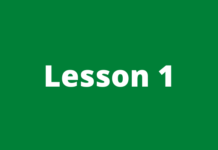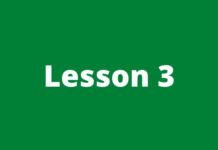This probably should have been the first lesson I posted. However, I thought it would be better for the newcomers to understand the structure of the market they are planning to work in and pick out their main instruments. Only then can the second stage begin where you can start to build your system of trading.
I assume you understand that most websites just provide you with the brokers’ training programs instead of handing out some real advice on how to learn to trade. It is neither good nor bad, but I do not think it solves the main problem nor answers the newcomers’ questions about how to Get into Forex Trading and not to lose a fortune.
There is nothing wrong with training programs, webinars, or workshops. Usually they are all about some specific strategies and methods of analyzing the market, and we will talk about them in detail at a later stage.
In this short lesson, I will provide you with specific recommendations based solely on my personal experience on how to form a self-teaching process. The strategies can come and go, they change and transform.
You may find a profitable combination and earn some money, but if you do not know how to analyze your own trading activity or adapt to the market changes, it will not take long for you to lose all your money. That is why you must lay out the right approach of learning from the very beginning.
If you want to learn to trade properly, you should follow a few simple rules.
- Take your time
Forex trading has nothing to do with casinos. Of course, luck is quite important, but it is unwise to rely on it completely. You should learn how to work with the financial instruments and, as you know, any training requires time. The most sensible approach is to divide the learning process into stages and take enough time for each stage, concentrating only on digesting information.
Remember, nobody would throw you right into the ocean when you have just started to learn swimming. Instead, the swimming instructor would show you some basic movements and teach you to put your head under the water.
- First, get skilled, then get a profit
First, you should develop your skills and form a habit. Trading is very much like a business and it requires being quick a quick decision-maker. If you take either good decisions slowly or wrong decisions quickly, you will only lose your money.
That is why, before depositing a large sum of money in your trading account and trying to catch the trend, you should practice your actions from the moment you turn on the computer until the moment you analyze your transactions at the end of the day until it becomes your second nature.
If you learn the right habits and practice your actions until they become automatic, it will be just a matter of time for you to get a profit.
- Do not skip the lessons
If you decided to take this course, please do not read the articles randomly. Of course, I have no doubts that some of the readers cannot be called the newcomers. Even if you think you know what the article is about from its title, you might be wrong. I share my own experience gained over a decade in each paragraph, so even an experienced trader will find some food for thought. There are not many articles on the website so, please, read them in order.
- Do the practice!
The most important thing about trading is keeping a diary and analyzing your trades. The irony is that most traders think it’s possible to either ignore the advice on keeping a diary or they start and then cease keeping one shortly thereafter.
There will be a lesson on this website concerning transaction accounting and analysis. All it takes for a beginner trader is to go through the lessons carefully and patiently carry out the practical tasks.
Naturally, some people are quite lazy, but those who manage to follow the instructions can avoid wasting a few years and losing their deposits.
- Do not consider the losing trades as failure
Once, I read a post on a trading forum that still really pisses me off. A trader said that the losing trade was like losing a battle but not the war.
A loss-making transaction is NOT a lost battle!
Do you think there is a trading strategy that provides a 100% profitable result and that the losing trades occur only as a result of the trader’s mistake? I am not aware of any such strategy.
Losing trades are a part of our work. A trader is supposed to get a profit during the whole reporting period (for example, within a week or a month). It does not matter how many transactions will be winning or losing. You may lose money by 50%, 60% or even 70% of your trades, but you can still make a good profit at the end of the day.
It is extremely important to deal with losses in the statistics and avoid getting nervous or doing stupid things instead of strictly following the strategy. If the strategy is wrong, you will understand it by analyzing your trades in cold blood at the end of the month. Panic and emotions have never led a trader to success.
Training plan
You can find a link to the list of the lessons in the menu of the website. They are set in the order I find correct for teaching a beginner trader. I do believe that one should learn forex trading as follows:
- Get motivated, find an approach to the learning process, and open your mind to digest information
- Comprehend the technical aspects of opening the positions and mechanics of making the trades
- Make it a routine to write down all of your thoughts and actions for further analysis
- Equip your workplace, configure the trading terminal, get rid of distractions, and pick the right time for work
- Master the basics of risk management and solve the problem concerning trade capital
- Pick a broker and open a demo account or a real account with a small sum of money. I will explain the difference in the following lesson and how to choose the best approach for you
- Develop insight by testing your trading strategies
- Study the basic approaches to market analysis. Comprehend the actions of the technical analysis tools and gain basic macroeconomic knowledge that can be useful in trading
- Create and test a trading strategy
- Follow your trading strategy, keep reports, and analyze the diary and the trade ledger over a specified period.
It seems to be quite easy, doesn’t it? If you want to master the most profitable profession and have good prospects, all you need to do is just follow a few simple rules.
This lesson does not have a checkup test at the end but I would like you to write any questions about further training or trading in general in the comments. Share your thoughts, expectations and feelings with us. I will do my best to answer all the questions.
Summing up
- It is not complicated to master trading. All you need to do is to take a balanced and quiet approach to the learning process and do not try to earn lots of money immediately.
- Treat the losing trades as a part of the statistics. It should not affect your mental condition.
- The main work lies not merely in making trades but also in analyzing them and keeping records.
These are the most important things I want you to take away from this course.
See you next time!
Sincerely, Pipbear






I tend to feel trading is like gambling, gains or losses are based on unknown ending. Just like you don’t know the end results of a football match, you cannot really tell what happens next in a market. The only difference is you can cut the losses, but in casino it is not the case.
I got into trading 3 years ago, I have gone through training and coaching, I have never stabilized yet I feel I have all this experience.
I will put this into practice
The trick here is sharpening the saw first, don’t rush into trading before understanding all the underlying factors.
To stabilize in the market, one need to be like a sniper in this game. Accuracy, patience and taking very high quality shots.
The reason why most traders fail focusing so much on the money instead of first perfecting your skill.
Spending one’s time in the chart will go a long way in making you a better trader….. take it
Much appreciated pipbear
Thank you Pipbear. I am going to follow the steps you recommend like tracking all my trades, thoughts and emotions when doing it. I think it gives a good understanding of myself. Some one says trading is not about mastering the markets, but mastering yourself.
So true Daniel, check my template of a trading journal if you need something to start with for tracking your trades https://docs.google.com/spreadsheets/d/1t4YqPZwNDir0oM2GP1_bDo26CafcWCm26yFvNoHWezc/edit?usp=sharing